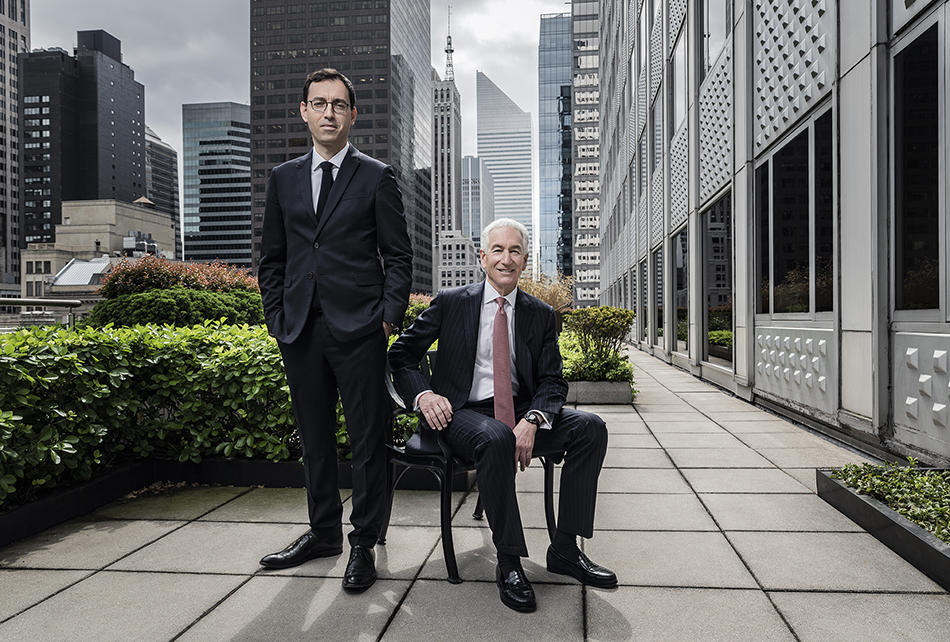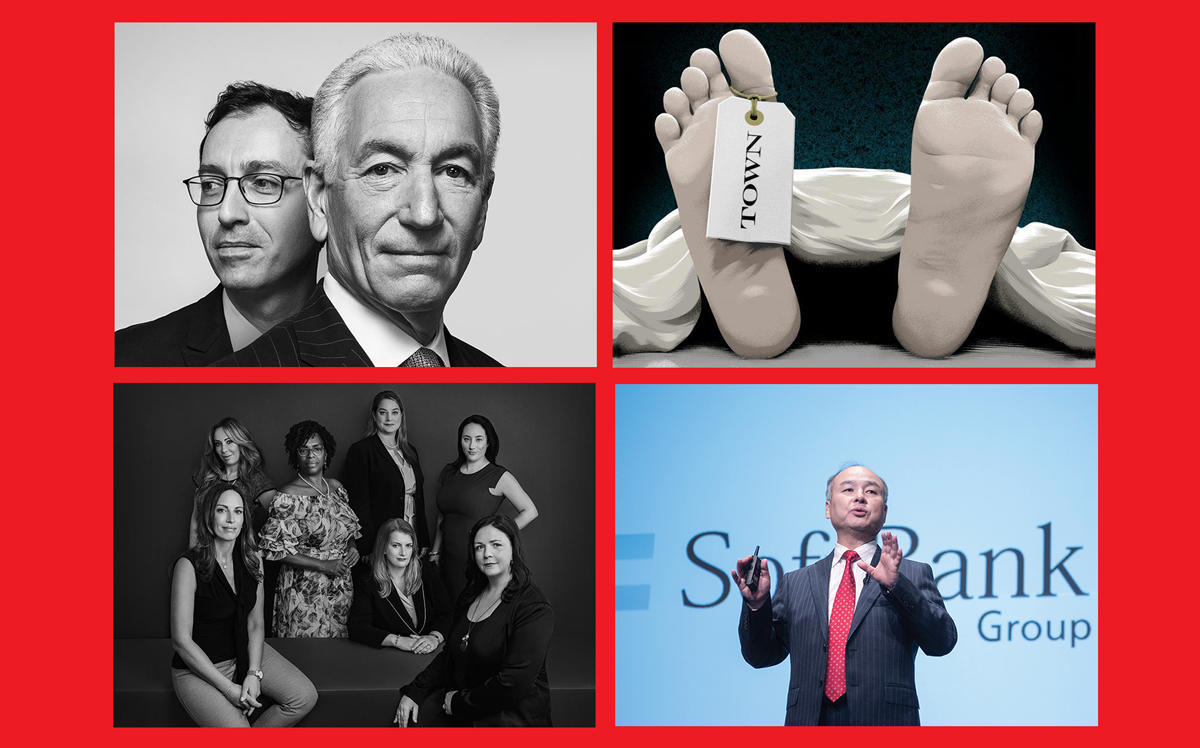A remote city in the Philippines and the diamond mines of Sierra Leone aren’t the places one usually looks to for New York real estate stories. But those are just a couple of spots where The Real Deal uncovered its biggest stories of the year.
Our reporters were the first to track down some of the most significant development plays and property trades, they broke the news of Town Residential closing shop and tried to answer existential questions like, “are the days of the traditional brokerage over?” We interviewed the most powerful real estate machers, and showed the potential benefit and cost from tech giants like Google and Amazon massively expanding their footprints in New York.
TRD also teamed up with other news outlets to produce investigative stories. Last week, we published the findings of a three-month long investigation into landlords accused of overcharging tenants for shoddy renovation work. It was a collaboration between TRD’s Will Parker and Kathryn Brenzel and WNBC’s Chris Glorioso and Kristina Pavlovic.
In Miami, our team covered the ups and downs of the condo market, while questioning the sustainability of one of the city’s biggest construction lenders. In Los Angeles, we tracked the continued emergence of tech companies like Facebook, Google and Amazon gobbling up more and more real estate. TRD launched in Chicago in April. In our inaugural year, we covered the rapid rise of megaprojects, the booming industrial market and the ever-growing trend of condo deconversions.
Back in New York, on the brink of 2019, we’re excited for what comes next. But before that, here are the biggest stories in 2018:
It was our most-read story of 2018 for a reason.
In late May, TRD’s Konrad Putzier and Will Parker paid a visit to Charlie Kushner at his family firm’s prized 666 Fifth Avenue. The interview started off with a bang: “Are you guys going to be assholes today, or are you going to give us a fair shake?” Kushner asked. “Because you’ve been assholes in the past.”
“Do you want me to throw you out of here now? Because I will,” he added at another point. “Then you can write whatever the fuck you want about me.”
Instead, what followed was an extensive interview with the Kushner Companies boss. He spoke openly about tenant harassment allegations and other investigations against the firm — and described ethics watchdogs as “guys who can’t get a real job.”
Kushner explained why the company’s 666 Fifth Avenue deal with Anbang Insurance Group didn’t pan out, and how Brookfield Property Partners jumped into the fray.
And of course, he opened up about his son Jared’s role in the White House as well as his own political beliefs.
“The thing that I put into this administration is my son,” he said. “That’s what, that’s my… I don’t share a lot of the Republican beliefs and values on a lot of issues. That being said, I don’t share a lot of the Democratic beliefs and values as I used to, much more firmly.”

Laurent Morali and Charles Kushner (Credit: Sasha Maslov for The Real Deal)
For months, reporter E.B. Solomont heard murmurings of Town Residential’s troubles — inability to pay bills, agents leaving, a cancelled holiday party — but it all came to a head in mid-April, when the firm told its nearly 600 agents that it would shutter its resale and leasing business.
“Due to extremely high commission costs and a fierce recruiting climate it was just not possible to make sustained profit,” Andrew Heiberger, who founded town in 2010, wrote in a LinkedIn post.
Indeed, the once swaggering residential real estate firm became a cautionary tale in a market that’s being reshaped. The brokerage world has become a battle for market share: there’s increased competition from tech-focused and venture-backed firms and discount brokerages; the relationship between firms and their star brokers is becoming increasingly complex; and the proliferation of lead generation is upping tensions between portals like StreetEasy and the brokerage firms that use its services.
“I always say to people, it’s not a great business,” said Jed Garfield of the Manhattan-based firm Leslie J. Garfield & Company. “If my name wasn’t on the door and you said, ‘Would you go into the business today?’ I don’t think I would.”
But it didn’t end with Town. In June, commercial brokerage Eastern Consolidated announced it was closing shop. After 37 years in business, it couldn’t keep up with institutional giants. And while it could have followed the steps of other mid-sized firms, Eastern founders Peter Hauspurg and Daun Paris decided selling wasn’t the right move. TRD examined what brought down the brokerage, and closely followed where its nearly 140 brokers landed.
When the glass ceiling won’t break
It’s been more than a year since Hollywood boss Harvey Weinstein was hit with a slew of sexual harassment and abuse allegations. Soon, the #MeToo movement was born, and whole industries began reassessing workplace policies on sexual harassment, gender discrimination and the like. And TRD felt an obligation to examine how those dynamics play out in the real estate world.
The result was a striking example of the work TRD can produce. Reporter Kathryn Brenzel sat with dozens of women, who opened up to her about the hardships they’ve faced in the industry and what they think needs to change. Brenzel examined the pay gap between men and women, and pored over dozens of lawsuits, finding that even the most diverse firms weren’t immune to allegations of harassment. (In August, Brenzel’s “Female hardhats breaking barriers” was published, an article which shed light on the unique set of circumstances women in the construction industry face.)

From top left: Laurie Golub, Daun Paris, Caaminee Pandit, Bess Freedman, Alicia Goldstein, Leslie Himmel, Pam Liebman, Melissa Gliatta, Toby Moskovits and E.A. Stribling-Kivlan (All photos by Sasha Maslov)
“We’re like all the other industries,” CBRE’s Mary Ann Tighe said. “If you think of the stories that have circulated over the years, it’s inevitable that it’s going to happen.”
But the story wasn’t just driven by narrative. Our project manager and researcher, Ashley McHugh-Chiappone, conducted a data analysis on the gender makeup in New York City’s top real estate brokerages and development firms. It was a heavy lift that took nearly three months, but the effort wasn’t in vain. Her work revealed that the leadership teams at most of the city’s largest development and investment firms are at least 70 percent male. And at the city’s 20 largest commercial brokerages, only three come close to having an even split of male and female brokers.
“People hire people that they know and people who look like them,” said developer Toby Moskovits. “[Commercial real estate] is a testosterone-laden environment. It’s hard as a woman in that world to find your place.”
(If you’re interested, click here for video interviews with some of real estate’s leading women.)
The year of SoftBank
Masayoshi Son must see a lot in U.S. real estate firms.
Through its Vision Fund, SoftBank has poured billions into tech-focused startups. Construction startup Katerra received an $865 million injection from SoftBank in January. In August, the Japanese conglomerate poured $1 billion into WeWork. In September, residential brokerage Compass and iBuying firm Opendoor each landed $400 million from the Vision Fund. And in November, SoftBank committed another $3 billion to WeWork, valuing the shared-office space provider at $45 billion thanks to another infusion.
With its sights on a second Vision Fund, there’s no sign of SoftBank pumping the breaks on investing any time soon. But according to a recent report from the Wall Street Journal, investors in the Vision Fund weren’t on board with a majority takeover of WeWork, which is forecasted to lose $2 billion this year.
A growing tech fiefdom
Soon, New York City may look like a more urban, densely populated (and colder) Silicon Alley.
In February, Google — which already held dominion over Chelsea and the Meatpacking District — moved to buy the Chelsea Market building from Jamestown for a whopping $2.4 billion. Not only was it the priciest single-building trade of 2018, it was only a sign of things to come.
Before the end of the year, Amazon finally put an end to perhaps the biggest real estate competition North America has seen in years. In all, 238 cities vied for Amazon’s HQ2, dangling incentives over the e-commerce giant. All of our bureaus covered the proposals in their respective cities.

Jeff Bezos
As the company narrowed its list of contenders, our New York team provided readers with think pieces on what made Long Island City a finalist and how Amazon’s presence could turn the westernmost Queens neighborhood into a company town.
Ultimately, New York won. Or half-won, anyway. And we pressed our sources on the immediate impact of the announcement, and crunched the numbers to see which residential brokerages are primed to cash in on Amazon’s move.
The following month, Google took the spotlight again, announcing it would invest $1 billion into a new Hudson Square campus and double its workforce in New York City. Again, our reporters hit the phones to figure out what the move means for the neighborhood.
A $15B juggernaut
When the northern Philippines offices of Avion BPO were stormed by armed security guards, one news outlet described it as a “daring raid carried out with military precision.”
The computers seized by the guards would later be used in CoStar Group’s copyright infringement suit against Xceligent, a client of Avion. Ultimately, Xceligent shut down after hemorrhaging cash. And the case was one of at least 33 such suits that CoStar had filed against competitors, customers and individuals since the 1990s.
So, TRD sent reporter David Jeans to Manila, teaming him up with local journalist Nancy C. Carvajal, to learn more. And Jeans, along with reporters Konrad Putzier and Christian Bautista, interviewed dozens of CoStar’s competitors, customers, former employees, lawyers and industry experts to detail the tech giant’s rise and its dealings with competitors.
“They’ve used litigation to suppress innovation in the space,” said Elie Finegold, the former head of global innovation and business intelligence at CBRE, the world’s largest commercial brokerage and one of CoStar’s biggest customers. “And over time, they have cultivated an adversarial approach to customers.”
The evolution of co-working
Once thought of as a home for the rogue freelancer or small startup, co-working companies proved otherwise in 2018.

(Illustration by Tim McDonagh)
WeWork — besides landing more cash from SoftBank — had a landmark year. It became New York City’s largest office tenant, and it launched a new investment fund with plans for a ground-up development in Austin, Texas. Moreover, the firm launched HQ by WeWork in August as a means to attract more mid-sized firms. It’s part of a larger effort — not unique to WeWork — to bring in more revenue by placing a focus on blue-chip, corporate firms.
And more traditional firms are jumping on the bandwagon, too. CBRE announced in October the launch of Hana, which will enter property management agreements with landlords to provide flexible office space to corporate clients. And in November, Tishman Speyer launched its own co-working brand, Studio.
Other highlights:
–Rough cut: It definitely isn’t your typical real estate story. Senior reporter Konrad Putzier took readers through the diamond mines of Sierra Leone to Antwerp and behind the stories of diamond traders turned real estate goliaths.

Rendering of 220 Central Park South (Courtesy Robert A.M. Stern Architects)
–Pay day: Vornado Realty Trust was mum on 220 Central Park South for years. But sales at the ultra luxury tower finally launched in October, with 83 percent of units already sold. The real estate firm stands to rake in $1 billion in profits.
–The Brookfield boom: Brookfield Property Partners was firing on all cylinders in 2018. The global real estate investor took on some of the city’s most ambitious redevelopment projects. Most notably, it swooped in as Kushner Companies’ white knight at 666 Fifth Avenue, taking over a ground lease with plans of overhauling the office building. It also picked up a 1.3 million-square-foot development in the South Bronx, ramped up its play at Greenpoint Landing and more.
–Discounts for days: It’s been a buyer’s market. Residential inventory is up and prices are coming down. In order to get deals done this year, developers and brokers had to relent on pricing.
–Real estate’s new favorite tax break: Though there are still some questions surrounding Opportunity Zones, real estate investors didn’t wait to launch funds specifically geared toward investments that can take advantage of the tax break. And all along the way, TRD’s reporters were there to explain the nitty-gritty of the program.
